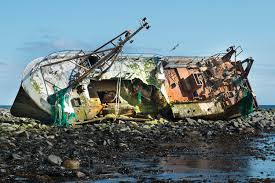中文词源
wreck 沉船,损坏
来自PIE*wreg,推,驱动,践踏,来自PIE*wer的扩大形式,弯,转,扭曲,词源同urgent,wreak。引申义扭曲的物体,主要用于指船的残骸,失事的船只等。
英语词源
- wreck
-
wreck: [13] Wreck goes back ultimately to the Indo-European base *wreg-, a variant of which may be responsible for English urge. Its Germanic descendant *wrek- formed the basis of a verb *wrekan ‘drive’. The native English descendant of this is wreak [OE], which originally meant ‘drive out’, and developed its modern meaning via ‘give vent to anger or other violent emotions’. Wreck itself was acquired via Old Norse *wrek and Anglo-Norman wrec, and etymologically it denotes a ship that has been ‘driven’ on to the shore.
A variant of the same base, *wrak-, lies behind English wretch [OE] (etymologically someone ‘driven’ out, an ‘exile’) and also possibly French garçon ‘boy’.
=> urge, wreak, wretch - wreck (n.)
- early 13c., "goods cast ashore after a shipwreck, flotsam," from Anglo-French wrec, from a Scandinavian source akin to Old Norse *wrek "wreck, flotsam" (cognates: Norwegian, Icelandic rek), related to reka "to drive, push," from Proto-Germanic *wrekan (see wreak (v.)). The meaning "a shipwreck" is first recorded mid-15c.; that of "a wrecked ship" is by c. 1500. General sense of "remains of anything that has been ruined" is recorded from 1713; applied by 1795 to dissipated persons. Compare wrack (v.).
- wreck (v.)
- "to destroy, ruin," c. 1500, from wreck (n.). Earlier (12c.) it meant "drive out or away, remove;" also "take vengeance." Intransitive sense from 1670s. Related: Wrecked; wrecking.
权威例句
- 1. The Navy is to carry out an examination of the wreck tomorrow.
- 海军明天将对失事船只进行细查。
- 2. What would he tell his parents if he had a wreck?
- 如果他出了事故,他怎么向他的父母交代?
- 3. The pilot struggled out of the wreck almost uninjured.
- 飞行员艰难地从失事的飞机中爬出来,几乎没有受伤。
- 4. The precise location of the wreck was discovered in 1988.
- 残骸的确切位置是在1988年发现的。
- 5. This sighting occurred during my dive to a sunken wreck off Sardinia.
- 这是我在撒丁岛附近的沉船残骸处潜水时所见的景象。
